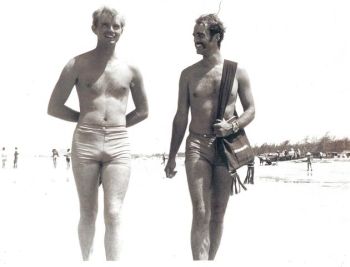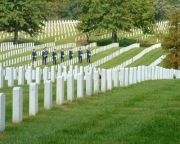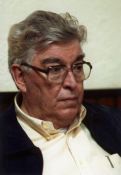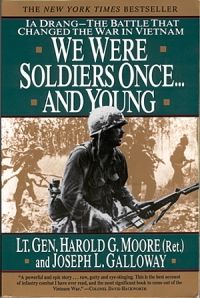
Publisher:
Bonnie King
CONTACT:
Newsroom@Salem-news.com
Advertising:
Adsales@Salem-news.com

~Truth~
~Justice~
~Peace~
TJP
Mar-20-2009 07:21

 TweetFollow @OregonNews
TweetFollow @OregonNews
We Were There and We Cared
By Perry Deane Young for Salem-News.comAt a gathering of war reporters in 1995, Peter Arnett summed up their shared experience in one sentence: "We were there and we cared." Not one of the armchair critics who spend so much time berating "the media" can say that.
 Perry Deane Young and Sean Flynn walking on the beach in Vietnam when they were covering the war there. Photo courtesy: Perry Deane Young |
(CHAPEL HILL, N.C.) - This article was originally written and published in 1995.
Just behind the colonnade above the Tomb of the Unknown Soldiers and down the hill from the memorial to those who went down with the Maine, a group of old war correspondents awkwardly assembled at Arlington Cemetery recently to pay tribute to our own.
 Arlington National Cemetery |
Boyd Lewis, aged 95, gestured toward the thousands on thousands of graves surrounding us and spoke of the rare privilege of having been able to write about them for United Press in World War II.
Young Roy Gutman of Newsday, winner of the 1994 Pulitzer Prize, told about the new difficulties of reporting in Bosnia, where 45 correspondents lost their lives.
When this article was published in 1995, more than 250 Americans had been killed pursuing the news in our country's wars in the last 100 years.
That figure, of course, does not include all those killed in the line of duty back home.

"But you guys," as I shall always remember my Saigon roommate's girl friend saying when he was nearly killed taking pictures for Time magazine, "you guys don't really have to be here...."
Maybe we weren't drafted, but if we were to be successful in our trade, or merely to live up to our ideals of personal courage, we most assuredly did feel we had to go to the wars of our time.
And here we stood trying to make some sense of what we'd done, especially in light of all those who never returned.
 David Halberstam |
This was surely one of the most peculiar groups that ever gathered at Arlington or anywhere else in America. Most of us sprang from an old school of journalism, fiercely independent and competitive.
We mocked the joiners and the clubs and fraternities they rode in on.
It was not our job to take sides; we were there to report honestly and fairly on what we were seeing with our own eyes.
We were used to covering everybody else's tragedies and grief, but totally unequipped to respond to our own.
If it had been left up to us, as David Halberstam pointed out from the podium, there would have been no such ceremony to honor our fallen comrades.
The buses would have been late or shown up at the wrong place--or something much worse.
A group set up to honor the victims of terrorism, No Greater Love, had realized that there was no memorial anywhere to war correspondents.
In 1987, the group planted a willow oak tree at this spot in Arlington Cemetery, with a small white marble open book bearing this inscription: "This tree grows in memory of journalists who died while covering wars or conflicts for the American people. One who finds a truth lights a torch."

And in the mid-1990's the word went out and 300 old war correspondents showed up for this day of "reunion and remembrance."
Halberstam spoke about how scared we all had been in Vietnam, but day after day, "we kept going out."
He spoke of "the almost fickle quality that allowed some of us to come back...."The beautiful wife of an ABC TV producer killed in Bosnia last year said simply, "Thank you for remembering."
And away toward the back, as always, my old UPI buddies and I carried on our cynical kibbitzing about the proceedings. Our chatter stopped abruptly as we watched the children and grandchildren of our former colleagues file past and drop a rose by the memorial tree.
"Oh man, I almost lost it there," said my friend Joe Galloway, holding back the tears. Working for UPI in the 1960s, Joe had been in and out of Vietnam several times.
He was one of the few reporters who covered the first full-scale battle, at Ia Drang, and now he--and Lt. Gen. Harold G. Moore--have published an extraordinary book about the battle with the poignant title, "We Were Soldiers Once and Young."
There have been two television documentaries based on the book and Joe told me about going back to Vietnam last year with the survivors of the battle.
They met up with their communist counterparts and returned to the scene of the slaughter.
No longer enemies, they embraced in shame for the utter stupidity which had first brought them to that place and left so many of them dead or maimed at such a young age.
I don't presume to know what it is--perhaps it has to do with that kind of shame you feel when you experience the true obscenity of war. It is something you know you'll never be able to talk about afterwards.
Oh, you'll talk about the war and being there and all that, but there's a more deeply felt element that's the real cause of that unspoken bond that cements a friendship in war in ways no other experience ever can.
I certainly don't offer war as any excuse for making friends; all I know is that there was something very special about the friendships sealed by war.
And I was grateful for the chance to be with some of them again and to remember those we left behind: Time photographer Sean Flynn and CBS cameraman, Dana Stone, who went down a road in Cambodia, April 6, 1970, and were never seen again; UPI's Kyoichi Sawada and the AP's Henri Huet, the most brilliant of photographers, the most gentle of men, and Larry Burrows and Kent Potter and Terry Khoo and Michel Laurent....
The last of the speakers at Arlington was Peter Arnett. He won the Pulitzer for his distinguished coverage in Vietnam. He was there for 13 years!
Vietnam was only the first of his 18 wars; now. When this was originally published in 1995, he was CNN's crisis man flying about to broadcast from wherever the danger is. His autobiography, published last year, is titled, "Live from the Battlefield."
Peter is also the best friend and mentor three decades of young journalists ever had.
He summed up our shared experience in one sentence: "We were there and we cared."
Not one of the armchair critics who spend so much time berating "the media" can say that.
=========================================================
 Perry Deane Young is the author of eight non-fiction books, two plays and one screenplay. His ninth book, Hanged by a Dream, was self-published in July of 2005. Perry Young’s first book was the widely praised Two of the Missing, a Vietnam memoir published in 1975 by Coward, McCann & Geoghegan hardback and Avon paperback. The David Kopay Story, which Young wrote with the gay pro football player, was published in 1977 by Arbor Hours hardback and Bantam paperback. The David Kopay Story was on the New York Times Bestseller list for nine weeks and was named one of the ten Best Books for Young Adults of 1977 by the American Library Association. To learn more, visit Perry's Website at: perrydeaneyoung.com
Perry Deane Young is the author of eight non-fiction books, two plays and one screenplay. His ninth book, Hanged by a Dream, was self-published in July of 2005. Perry Young’s first book was the widely praised Two of the Missing, a Vietnam memoir published in 1975 by Coward, McCann & Geoghegan hardback and Avon paperback. The David Kopay Story, which Young wrote with the gay pro football player, was published in 1977 by Arbor Hours hardback and Bantam paperback. The David Kopay Story was on the New York Times Bestseller list for nine weeks and was named one of the ten Best Books for Young Adults of 1977 by the American Library Association. To learn more, visit Perry's Website at: perrydeaneyoung.com
=========================================================
Editor's Note: We are extremely honored that Perry Deane Young shared this amazing and emotional story with our readers. The work that he and a handful of other photojournalists and correspondents brought forth in those years delivered the real and full impact of a bloody war halfway around the world, that Americans were otherwise sheltered from. The world is a cruel place and the motives of people are frequently dark, even beneath their otherwise bright exteriors. People like Perry Young and David Halberstam, John Steinbeck IV, Sean Flynn, Dana Stone and Tim Page, laid it all on the line in a confusing time to capture the essence of one thing; the truth. Their coverage was heavily criticized, and called many things and even held accountable for political failures, but war is hell and when the smoke clears, layers of destruction and tragedy lie smoldering and images of these events are scored in the minds of the witnesses. I offer my most solemn and sincere respect and gratitude to these brave people who chose to make sure the world caught a true glimpse of the Vietnam War through the smoke and haze of U.S. Cold War propaganda.
Tim King
Articles for March 19, 2009 | Articles for March 20, 2009 | Articles for March 21, 2009

Quick Links
DINING
Willamette UniversityGoudy Commons Cafe
Dine on the Queen
Willamette Queen Sternwheeler
MUST SEE SALEM
Oregon Capitol ToursCapitol History Gateway
Willamette River Ride
Willamette Queen Sternwheeler
Historic Home Tours:
Deepwood Museum
The Bush House
Gaiety Hollow Garden
AUCTIONS - APPRAISALS
Auction Masters & AppraisalsCONSTRUCTION SERVICES
Roofing and ContractingSheridan, Ore.
ONLINE SHOPPING
Special Occasion DressesAdvertise with Salem-News
Contact:AdSales@Salem-News.com


Salem-News.com:

Terms of Service | Privacy Policy

All comments and messages are approved by people and self promotional links or unacceptable comments are denied.
Benjamin January 9, 2013 1:09 pm (Pacific time)
What is the font used on current Army dog tags? What is the font used on Vietnam Era Army Dog Tags?I'm looking to create a graphic using the current font used for Army Dog tags. I really don't want to offend anyone by using the wrong one. I know that older dog tags resemble American Typewriter font. I cannot find the current font used.
Editor: This is one of several comments today that was oddly misspelled, and two people asked about dog tags from two IP addresses. If anyone really is seeking this information, simply visit your local national guard headquarters or ask them to fax it to you.
Forexfobere July 13, 2009 11:56 pm (Pacific time)
I guess I just need to check some more resources regarding this, because it sounds interesting.
Henry Ruark March 23, 2009 8:38 am (Pacific time)
To all: Please note that last few comments plainly emphasize the brutal facts that led to action against leading reporters during the Vietnam War, It surely now appears that the stories that got them into trouble were accurate and the result of their professional integrity and courage. That should surely frame up much of what is now occurring re everything from "stimulus" to transformative actions now clearly demanded for multiple areas of 21st Century life.
Was There March 22, 2009 11:15 am (Pacific time)
Stephen there are certainly many homeless veterans of all wars which is just heartbreaking and we need to increase our resources to help these people. They and our senior citizens should be our number one domestic priority. Though I would like to point out, many Vietnam veterans are approaching their retirement years (many already have), on average they do have a lower unemployment percentage rate than their civilian peers and earn/ed an average of 18% more. Any veteran out there, you should take the time and talk to a qualified veteran's counselor and get updated on what chemicals, etc. you may have been exposed to and file a claim. Get it on record. If you know any veteran suffering from any disability (like a chronic disease) it may be one covered for VA comp. and treatment. The list of Agent Orange maladies is growing, so get updated, you may "NOW" have a valid claim. Do not procrastinate, do it!
stephen March 21, 2009 5:29 pm (Pacific time)
My brother, who was a helicopter gunner in vietnam, mentioned something to me awhile back about agent orange, and how he is getting health care benefits from it. I just called him to refresh my memory. He says "if you call the VA, and mention agent orange, they give you a list of about 40 ailments that come from it". If you can prove the ailments, they support your health care. He has diabetes, which is on the list, so he is getting monetary support from the VA. For those who dont know, agent orange was a chemical to kill the trees because that is where the vietnamese had their advantage. Something to think about. By the way, my brother is now a missionary in Mexico, has built a few churches and several orphanages. In my humble opinion, it is his faith in God that he did not turn out homeless.
Was There March 21, 2009 9:26 am (Pacific time)
Art Laughlin, approximately 2/3's of those who served in VietNam were considered volunteers, whereas 2/3's of those in WWII were drafted. May I suggest that you use any search engine and put in "myths about Vietnam." You will come up with many hits, look around and go to the sources they site and if you don't like the sources and data, try to find some that dispute those sources. Geting info from the ones who were there is far superior than those who were not there.
Art Laughlin March 20, 2009 2:44 pm (Pacific time)
They are heroes in ways that even military people can't understand or appreciate. Veterans of a war that was largely draft-based should especially value the contributions of these newsmen and women who put themselves in harm's way time after time.
Was There March 20, 2009 11:46 am (Pacific time)
Nerve gas is pretty serious business and it would have been a war crime with an attached death penalty if used by any American, not just U.S. military. Contrary to Hollywood movies and other mythmakers, there was an inventory control process in effect for these kinds of gas agents. There has never been any evidence to support the allegation that any nerve agent was used by Americans. Just do the research, no bonafide newstories. There were some rumors that the USSR made available some gas agents for the North Vietnamese, Laotians and Cambodians, but like all unfounded rumors we should be skeptical until some evidence comes forward, or information becomes declassified. Don't hold your breath waiting. It was not unusual for the Pentagon and the military throughout the world to muzzle some reporters who were irresponsible with false claims and misinformation. They also rankled military leadership by ommitting the stories on the brutal war crimes by the NVA and Charlie. Military personnel were not big fans of some of these reporters, but learned years later that it was the editors back in the states that were spiking many of their stories. These reporters often got the short shrift from us, and I feel bad about that, but we didn't know what was going on at the time, a brutal war was being waged and attention was focused on that. It was a different time then than now, but far more lenient compared to WWII when the Sedition and Treason laws were in effect. I expect that if national security becomes threatened we shall see those laws enacted once again.
Henry Ruark March 20, 2009 10:16 am (Pacific time)
To all: Can both acknowledge and endorse what Tim reports on this one, from knowledge when it happened. It is far from unusual to find probing reporter in deep doo/doo with Pentagon and others; encountered first of number of situations early at UPI-Bsn,later in D.C. when at work on NDEA, using contacts to build case a la G.I. Bill. Can be near-fatal for a sharp reporter to do the job well and honestly, where "the military" or "the elite" OR "the corporate clique" are at any risk, however small. That's one major reason for start/continuation of GOP neoconnery noise machine, seen here from time to time... Never forget that owners and some publishers embedded deep in corporate clique, with main driving motivation profit, not community/commonweal service, despite responsibilities from First Amendment protection of our "free press" !!
Steve March 20, 2009 8:03 am (Pacific time)
Is that the same Peter Arnett who was fired by CNN for participating in the wholly false "story" about the US allegingly using lethal chemical agents in Vietnam? What a journalistic "hero."
Tim King: Yes, he is probably the most experienced war reporter in history. I'm not even sure if the sarin gas story in Laos that he was fired over at CNN, wasn't actually correct. I just read this quote regarding Peter's CNN firing.
"His firing was a direct result of Pentagon pressure."
Perry Smith [a retired USAF major general and former CNN consultant who resigned in protest over the Tailwind report] told the Wall Street Journal last July that CNN would not get cooperation from the Pentagon unless Peter Arnett was fired. So who knows? When a reporter gets in that deep there is no telling who their enemies are and how far they are willing to go. I think it is sad that you took a cheap shot.
[Return to Top]©2025 Salem-News.com. All opinions expressed in this article are those of the author and do not necessarily reflect those of Salem-News.com.